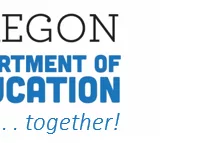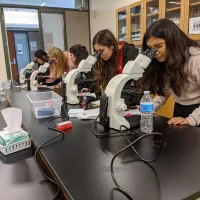
In the 2023-24 school year, nearly two thousand more children with disabilities in Oregon received special education services in early childhood learning classrooms compared to the 2020-21 school year.
That’s the key finding in the Oregon Early Childhood Inclusion Initiative Impact Report released today by the Oregon Department of Education and the Department of Early Learning and Care.
“Access to early childhood learning classrooms helps children develop important skills, including social, emotional, communication, thinking, literacy, and physical skills, laying a strong foundation for future success,” said Dr. Charlene Williams, Director of Oregon Department of Education. “Caregivers, teachers, and providers also benefit from on-the-job training and coaching on lesson planning. This approach strengthens their ability to nurture essential skills in young learners, create inclusive learning environments and set children on a path to long term success.”
“This report elevates the importance of partnering to meet the needs of our youngest children with robust support and high quality, inclusive child care experiences,” said Alyssa Chatterjee, DELC Director. “It’s exciting to see state agencies, local programs, and community organizations collaborating to advance the shared goal of ensuring all children, regardless of their abilities, can thrive in early learning settings.”
Other key achievements and findings include:
- Access to preschool programs for children experiencing disability has increased 17% since this initiative began in 2020.
- Early Intervention/Early Childhood Special Education programs and staff prove to be essential partners in advancing quality inclusive early learning across the state.
- In the last two years, under the direction of ODE and the Oregon Early Childhood Inclusion State Leadership Team, the Early Learning System Initiative at Oregon State University developed and hired a team that has dramatically increased access to Pyramid Model training for trainers and directly for early educators to more than 1,000 professionals. This Inclusion Initiative at OSU is now jointly funded by DELC and ODE.
- A systems approach leads to better outcomes for children and families. Two important national frameworks for systems change named in the report (Pyramid Model and Early Childhood Technical Assistance (ECTA) Inclusion Indicators) support local leaders to develop systems that promote social and emotional learning of children and build effective inclusive environments supported by best practices.
- As a result of investments by Oregon Department of Education’s Early Intervention/Early Childhood Education System, ePyramid modules are now available for free and are accessible to every early educator in Oregon in both English and Spanish. The training materials include foundational strategies that help early educators to engage all children in learning that meets their developmental and social/emotional needs.
The report publishes as America celebrates the 50th anniversary of the Individuals with Disabilities Education Act (IDEA). The law ensures that students with disabilities have the same access to general education and learning opportunities as their non-disabled peers, with support and services provided in their local schools and preschools.
Today, Oregon is moving closer to making this a reality for preschool children and beyond, leading to positive changes in lifelong learning for future generations of Oregonians.
Content provided by Oregon Department of Education















